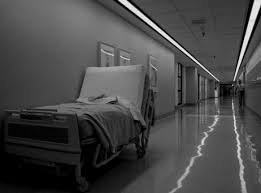Filling the Beds: ICU Usage Among Terminal Eight Times Higher Than in England.

England does a better job of offering elderly and terminal patients end of life choices. The November 1 issue of American Journal of Respiratory and Critical Care, published by the American Thoracic Society, reports on a new study by Dr. Hannah Wunsch at Columbia University:
Patients who die in the hospital in the United States are almost five times as likely to have spent part of their last hospital stay in the ICU than patients in England. What's more, over the age of 85, ICU usage among terminal patients is eight times higher in the U.S. than in England, according to new research from Columbia University that compared the two countries' use of intensive care services during final hospitalizations.
"Evaluating the use of intensive care services is particularly important because it is costly, resource intensive, and often traumatic for patients and families, especially for those at the end of life" said Hannah Wunsch, M.D., M.Sc., assistant professor of anesthesiology and critical care medicine, of Columbia University, lead author of the study. "We found far greater use of intensive care services in the United States during terminal hospitalizations, especially among medical patients and the elderly."
Among the statistics culled from the study:
They also found that hospital mortality among those who received intensive care was almost three times higher in England than in the U.S. (19.6 percent vs. 7.4 percent). But when examining deaths overall, only 10.6 of hospital deaths in England involved the ICU, whereas 47.1 in the U.S. did. Of those over 85, only 1.3 percent received ICU care in England vs. 11 percent in the U.S. But young adults and children received ICU services at similar rates in both countries. "These numbers need to be interpreted with caution," explains Dr. Wunsch, "as the differences in mortality for ICU patients likely reflect the higher severity of illness of patients admitted in the first place in England. The data do bring up the interesting question of how much intensive care is beneficial. Doing more may not always be better." (emphasis mine)
What is often called "rationing" in the US is actually a predatory medical industry paying for its equipment. The more beds you have the more you need to fill. The more services you offer, the more you need to sell. We live in a culture where natural death has become cost-ineffective. And our government has failed, as with so many other industries, to enforce ethical, humane regulation.
via FuturePundit.
Labels: end of life care, rationing


0 Comments:
Post a Comment
Subscribe to Post Comments [Atom]
<< Home